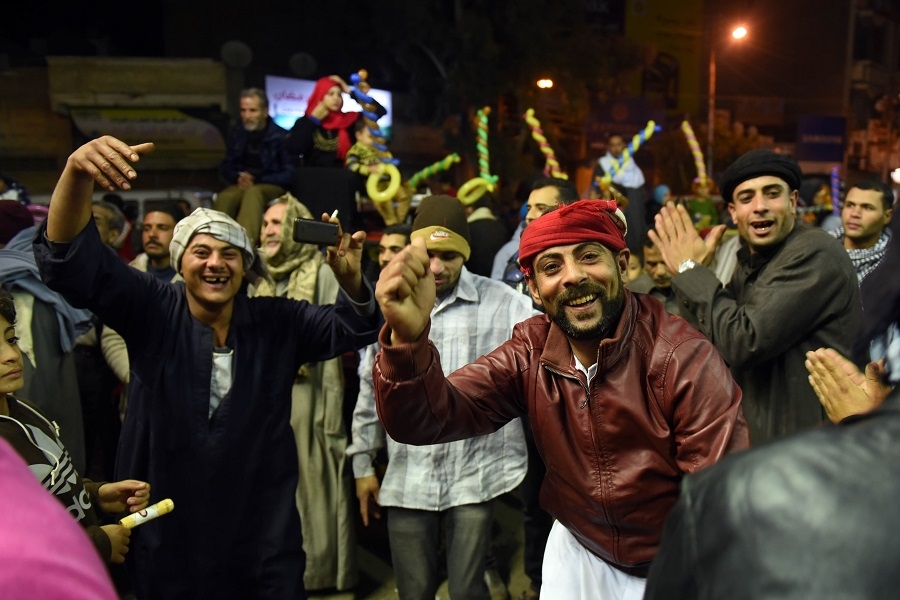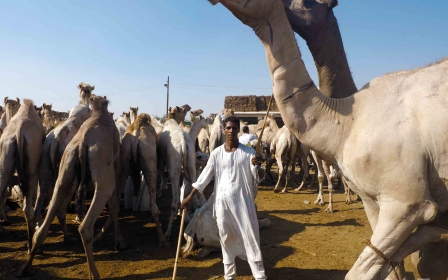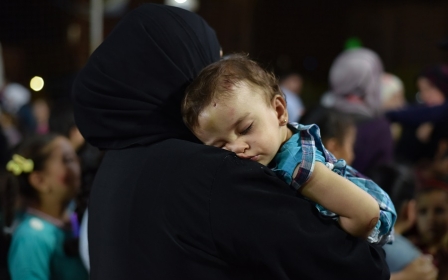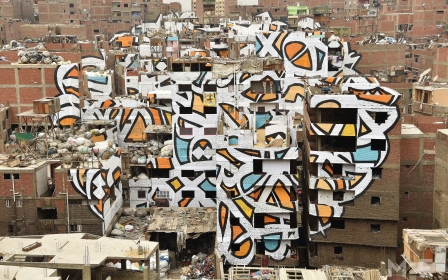Will the real Mohamed please stand up...

CAIRO - He arrives a bit late at the bar-terrasse, perched in a downtown building with a view of Cairo’s dusty skyline, peppered by satellite dishes. Among his friends he is known as Andeel. But Andeel was in fact born Mohamed, like the large majority of men in Egypt.
“This name provokes a lot of jokes among my friends,” explains Andeel. “We’re all Mohamed, so we would call people Mohamed even when they have another name, like 'hey Mohamed!' - instead of 'hey dude!' Even among our girlfriends, it became a private joke,” he explains to Middle East Eye.
Living in Egypt, it is not unusual to collect more than 30 Mohameds and 20 Ahmeds in a phone contact list. But why do nearly all Egyptian males share the same few names?
According to Columbia Encyclopedia, Mohamed is the most popular name in the world. In the UK for instance, the list of the top 100 baby names of 2014 conducted by babycenter.co.uk showed Mohamed had risen 27 places from the previous year to take the number one spot for boys.
Mohamed is the transcription of the Arabic Muhammad, commonly translated as “full of virtues” or "praiseworthy". Very popular among Muslims, it is commonly given to the first newborn son of a family.
Statistics are hard to find on the subject, but cross-referencing sources, Mohamed appears to be the most common name given to newborn males in Egypt, but also in Libya, Algeria and Morocco, closely followed by Ahmed, and Mahmoud.
There have been no studies on the subject of naming in Egypt. Moreover, MEE’s request for birth records was denied. It is amusing, however, to consider the following:
* Of the 29 male ministers in the Egyptian government’s cabinet, nine are called Mohamed, and two, Ahmed.
* On the national football team, there are four Ahmeds and three Mohameds, followed by a few Mahmouds and Abdallahs, over 22 players, including 11 substitutes.
* The film Clash, directed by Mohamed Diab, which opened the Un certain regard section of the Cannes festival early this year, counts seven Mohameds and three Ahmeds among the 17 male cast members. The directing team includes three Ahmeds and two Mohameds.
The phenomenon is so important that it causes confusion and troubles on a daily basis.
“The first time I realised I didn’t have a unique name was in high school when I found myself in a classroom with 60 other Mohameds,” Andeel recalls. He says that it feels as if his identity was denied by being clumped together with other people with the same name.
Intimate identity
For Mark Heerdink, assistant professor of social psychology at the University of Amsterdam, the feeling is not surprising. “[Your name] is an aspect of your intimate identity, just as you have a certain type of hair or features,” he explains. “People strive to be similar in some ways but unique at the same time. As soon as people feel they’re losing their uniqueness, they feel transparent, interchangeable; you may feel connected to other people, but not special.”
Andeel says that being a child sharing such a common name protected him from being excluded or treated as different. “If you’re not a Mohamed, Ahmed or Mahmoud, you’re actually the strange one. Not having a very common name can get you into trouble and you can face discrimination from other children. But of course a name can make you feel very special and it can be frustrating to feel too normal.”
Schools are actually very representative of the importance of the issue. Mohameds, Ahmeds and a few others are so widespread in Egypt, that teachers use second names to distinguish one child from another. “But it gets tricky too because many guys actually have the same second name. In my class, I remember there were three Mohamed Ibrahims,” says Andeel.
In fact, there is no family name strictly speaking in Egypt. A male's full name traditionally includes the given name, followed by the father's, and then the grandfather’s name. As the perpetuation of common names has been going on for many generations, it’s not surprising to find some Ahmed Mahmoud Mohameds. If each of these relatives were called Mohamed, it would be unmanageable, like the famous football player, known as “Qeish Aboutrika,” named after his father, grandfather and great grandfather who turned out to be Mohamed Mohamed Mohamed.
Religion and tributes
Many Muslims are convinced that naming their son after the Prophet is an affirmation of their allegiance to Islam and a form of blessing for the child.
In this respect, Ahmed, Mahmoud (both from the same root) and all names starting with “Abd,” like Abdallah, the root of which means slave of God, are incredibly popular. “People call children by the name of the people they care the most for: the Prophet and his companions,” says Andeel "Following the Prophet's path is seen as the best way to live life.”
Yet some conservative people conversely think it is better not to give such names to children. In conservative Muslim countries, like Saudi Arabia, many people consider giving certain names, like the names of Angels like Jibreel (Gabriel) to human beings and consider it haram (forbidden). But paying tribute to the great historical leaders of Islam by naming your child after them is still the most common practice in most Muslim countries.
For Andeel’s family, religion was not the point anyway. “When my parents had me, they were not religious at all and in fact considered themselves to have been relatively rebellious. The influence of President Nasser was still strong: people were encouraged to get rid of Islamic roots and acquire more secular or “futuristic” identities. They wanted to break the loop. I got my name from my grandfather. He was a communist who went to jail under Nasser and my parents thought giving me this name was actually holier than giving me the Prophet’s,” he laughs.
“It’s part of the tradition too,” explains Ahmed, aged 31, better known as Mido: “People also usually give their boys the name of the last important male relative who died in the family before the birth. As they were all named the same already, it’s going on, over and over again,” he says.
Multiple names
Over a couple of beers, he explains he actually has several names. “At home, I would be Ahmed, at school I became Turk, my second name and outside, I would be Mido, a diminutive. But there are so many Ahmeds, that we all get Mido as a nickname, so Egypt is now filled with Midos and Mos we need to find other ways,” he smiles.
Mido was actually not even born Ahmed. “I was born Metaht. One week after my birth, my grandfather died. So, my parents switched it to Ahmed, to pay tribute to him,” he explains.
This social trend is so pervasive all over the country to the extent that a sort of mythology surrounding the names has developed. According to an urban legend, somewhere in Egypt there are seven jars filled with gold, hidden under a temple. If you dig it up and find the jars, you will find them full of sand, unless your name is Mohamed.
For women, the trend is not as clear. Some names considered blessed, such as Fatima or Zainab, are widespread, but Egyptian culture pays less attention to the status of a woman's name. “The sexism in our culture is very visible in this aspect too,” notes Andeel. “People still consider that a boy is more important than a girl, that’s why this phenomenon is more frequent amongst men. We also know that a woman will not keep her name forever because as soon as she gives birth to a boy, she becomes "the mother of" - Uum something.”
Mohamed, Ahmed and other names are for this reason even more widespread than on paper, as women also adopt the name Uum Mohamed or Uum Ahmed.
The pseudonym solution
For some people, getting a pseudonym is a way to escape the banality their parents have imposed to them. “It’s a strong aspect of intimate identity but not a core. It’s a fixed attitude, but not unchangeable. If you don't like it, if it doesn't fit you, this would be a social problem,” explains Mark Heerdink. “This makes you less likely to want to wear this name, to seek out situations where you use it. It’s very common in the transgender culture or with migrants. Sometimes, getting a pseudonym helps you to fit in and to communicate better with other people. ”
For Andeel, the pseudonym has imposed itself on him. “At school, people started to call me 'Qandeel' which is my second name. I didn’t really like it because it means jellyfish. I didn’t realise it was a cool pseudonym until I became a cartoonist. I moved to Cairo pretty young, I quickly started to interact with important people who put you in categories. I’m from a boring place in the countryside and I made a lot of effort to not be identified as someone from there, to not sound like a countryside guy. I felt bad that people would dismiss me. It’s part of the reason I’ve decided to use Andeel - without the Q - as my nickname. I relate more to this name than Mohamed because this one makes me feel more visible.”
While speaking, he remembers more things he can relate to in this search of identity. In 2008, Andeel started a local radio station in his hometown of Kafr-el-Sheikh with a fictional character to host the show. “His name is Oustaz Mohamed” - Mister Mohamed, smiles Andeel. “It’s actually a way to live a bit of the life I would have had as a Mohamed: I wanted him to be as typical and banal as possible,” he explains.
Breaking traditions
Ahmed says that things could be changing as some people are beginning to experiment with new names for their children. “You know, a few days ago, I met one of my cousins. She’s pregnant and I asked her about the name she chose. She said: 'If it’s a boy, he will be Mohamed, it can’t be wrong, it’s wholesome.' Like we don’t have enough Mohameds," he exclaims. “Well, she said Mohamed or Ryan!” Ahmed bursts out laughing. “I can’t say I really like Ryan, but it can’t be worse than Mohamed or Ahmed in 2016. People go for it by instinct, but then realise there are other options. They go check on internet and find more original ones. It changed a bit recently.”
Thomas, who has two sons - Mahmoud, 12, and Ahmed, nine - agrees that if he had a boy today, he would find another name. “Back in those days, my wife and I just went for the safest choice,” he explains to MEE. “I would probably not chose those names for my children today. I would choose something more modern, but not too far away from the culture my children would live in,” he says. But he adds: “It’s important to be named after significant members of your family or figures from Islam - it makes you feel as if you belong to something.”
In fact, he himself is one of these people who dropped their name for something less common.
Born Ahmed, he took on the name Thomas six years ago. “I became friends with this Italian guy who was travelling. He used to write a lot during his trips and while in Egypt, he ended up with a bunch of Ahmeds in his notebook. So, he decided to call me Thomas.” He liked it and so kept the new name. “Thomas just makes it easier for people and it’s like a little buzz; it gives me the air of being a foreigner” he said with a smile.
This article is available in French on Middle East Eye French edition.
New MEE newsletter: Jerusalem Dispatch
Sign up to get the latest insights and analysis on Israel-Palestine, alongside Turkey Unpacked and other MEE newsletters
Middle East Eye delivers independent and unrivalled coverage and analysis of the Middle East, North Africa and beyond. To learn more about republishing this content and the associated fees, please fill out this form. More about MEE can be found here.




